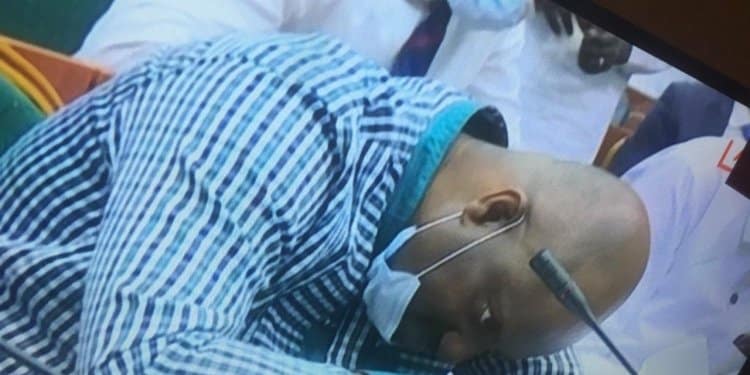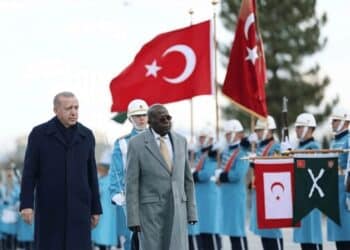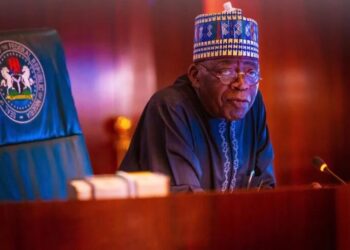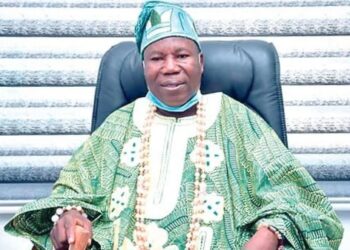Nigeria is a theatre of the absurd (‘theatre de l’ absurde’, French; a post-world war II theatre in which natural things are ignored or distorted, to convey the irrational).
But that is hardly news nowadays. What is most painful is that Nigeria has homogenized and accepted as rare, absurdities that saner climes would vehemently revolt against. Madness, both in the private sector, and in government, appears legitimized.
Corruption, once openly vilified, is now hugged and cuddled, more than ever before. Corruption proudly stunts about like a peacock.
Truth be told, Nigeria keeps outdoing herself and keeps degenerating into the biblical bottomless pit. Virtually every week, Nigeria reaches hitherto unimagined low levels.
Nigeria has become a “one-scandal-per-week” country. In fact, there is today, practically no sublime bar or standard to which Nigeria can be held.
The situation is so bleak that if we continue this way, an implosion would certainly be inevitable. Just when you thought you had seen it all, more absurdities, asininity and malarkey emerge. We now appear unshockable with shock. We now ‘shock’ shock itself.
The Ruptured Dreams
The year 2015 was supposed to mark Nigeria’s resurgence and resurgimento. It was a year literally thought to have been written in the stars; the year that will herald an end to bad leadership and corruption in Nigeria.
The Nigerians dreamt dreams. The enthusiasm, albeit terribly misplaced, was reasonably justifiable to most Nigerians. I was not one of them, being a student of history, and a leading Activist in the trenches during the scourging days of the military. President Muhammadu Buhari had just ridden to power on the wings of a sea of promises to purge Nigeria of corruption, return power to the masses, and rid Nigeria of ravaging insecurity.
He said he would lead from the front as General. When Buhari won, the euphoria was understandably boundless. One young man trekked from Lagos to Abuja in celebration. Another rode from Kaduna to Abuja. Only when Nigeria beat Brazil in the semi-finals during the 1996 Atlanta Olympics did Nigeria witness such uncontrollable euphoria.
Beating Brazil (the fearsome football nation), in the semi-finals was a big deal. It even eclipsed the final trouncing of Argentina to win the gold medal. It was August 3, 1996. Nigerians had kept awake, with suspense and bated animation. It was the 94th minute magical strike by Emmanuel Amuneke, who latched on a free kick from Wilson Oruma, beat an offside trap, and netted the diamond goal, that did it
Nigerians erupted in an ungovernable frenzy. Sani Abacha’s bad government was soon forgotten. The finals was the first African gold medal at the Olympics. Africans celebrated. I remember the day very clearly. I was tying a wrapper in the village manner, with only a ‘dross’.
I literally ran out nearly naked, when the wrapper fell off me. My wife ran after me and grabbed me, to put on a knicker. It was in our then home in Igando, Lagos. I immediately declared free drinks for the entire street. I remember drenching my body with bottles of beer. Everyone was simply mad with elation.
The Bonfrere Jo hungry lions comprised of some of the best ever in Nigerian football. Captain Kanu Nwankwo (who netted the golden goal in the 94th minute), Emmanuel Amuneke, Wilson Oruma, Jay-Jay Okocha, Victor Ikpeba, Daniel Amokachi, Garba Lawal, Abiodun Obafemi, Teslim Fatusi, Abiodun Baruwa, Uche Okechukwu, Celestine Babayaro, Tijani Babangida, Emmanuel Babayaro, Mobil Oparaku, Dosu Joseph, Taribo West, Jonathan Akpoborie and Patrick Pascal.
The team showed a “one Nigeria” that knew no religion, ethnicity, culture, language, social background, or such primordial considerations. Are we there today? No. Nepotism, ethnicity, cronyism, prebendalism, favoritism, religiosity, sectionalism, mediocrity have since taken over. Shame!
Where We Are Today
Thus, five years after Buhari’s promised “change”, Nigerians have been sold a façade that papered over an obsession to seize power by all means. Just for its glorification.
The World Bank reports that an estimated 87 million Nigerians live on less than $1.90 a day, thereby making Nigeria occupy the unenviable position of the poverty capital of the world. Economic growth is at a snail speed. Nigeria’s unemployment rate is pegged at 23.1%; while underemployment rate is at 16 .6%. Police brutality is at an all time high. Press freedom is under siege and human rights of the citizens only exist at the pleasure of the ruling class. Insecurity, book haram, herdsmen, kidnapping, armed banditry, suicide, rape, tears, sorrow and blood (thank you, Fela), overwhelm us.
What is worse? The current administration appears to have fully embraced corruption which it had swore to eliminate. Corruption in the Buhari administration, is to say the least, mind-boggling.
Those naïve and incurably optimistic Nigerians who had taken Buhari’s promise to wage a brutal, but constitutional war on corruption, hook line and sinker, are smarting with disappointment.
The so called war on corruption is surface, brutish, sectional, preferential, directionless, and appears to be a mere tactic to intimidate the opposition, rights activists, dissenters and government critics. Recovered loots are being re-looted (the mother of all corruption).
Instances abound of series of corruption scandals that have rocked the Buhari administration. For instance, in 2018, Kano State Governor, Abdullahi Ganduje and a member of the ruling APC, was recorded in of one of the most brazen acts of corruption in Nigeria, after videos emerged of him receiving alleged bribes from a contractor.
However, in spite of the clarity of the videos, President Buhari still endorsed him for a second tenure. It was like saying Nigerians could go to hell. Had Buhari public insisted that the governor be investigated (since he cannot be prosecuted due to his immunity under section 3 of the Constitution), even if pretentiously, Nigerians would have applauded him and the anti-corruption fight given a boost.
Also, in May 2018, The House of Representatives Committee on Emergency and Disaster Preparedness, threatened to issue an arrest warrant against the Director General of the National Emergency Management Agency (NEMA), Mustapha Maihaja, after he failed to appear for questioning over allegations of violation of public trust. Maihaja and NEMA were indicted for mismanaging N5.8 billion earmarked for the North East Intervention Fund. How did it all end? I don’t know. Do you?
In 2016, the Senate ad-hoc committee on “Mounting Humanitarian Crisis in the North East”, led by Senator Shehu Sani, indicted the then Secretary to the Government of the Federation (SGF) appointed by Buhari, Babachir Lawal, in a N200 million contract scandal for the clearing of “invasive plant species” in Yobe State by Rholavision Nigeria Limited; a company he owns. The trial is currently ongoing.
The embarrassing suspension and fall from grace to grass of the hitherto invincible and imperial Acting Chairman of the EFCC, Ibrahim Magu, for alleged corrupt practices, is perhaps, the most significant indicator of the impotence of the anti-corruption scourge in Nigeria.
The NDDC Shame
The most recent example of the corrosive corruption staking a vehement claim in the ownership and control of Nigeria’s commonwealth manifested in the guise of the corruption scandal currently rocking the Niger Delta Development Commission (NDDC).
The NDDC is a Federal government agency established in 2000, by Nigerian president, Olusegun Obasanjo.
Its sole mandate is to develop the oil-rich Niger Delta region of Nigeria that has been in tatters since oil was first discovered in 1956 at Oloibiri, in the present day Bayelsa. In September 2008, President Umaru Yar’Adua announced the formation of a Niger Delta Ministry, with the NDDC as a parastatal under it.
One of the core mandates of the Commission is to train and educate the youths of the oil rich Niger Delta region, to curb hostilities and militancy, while developing key infrastructure to promote diversification and productivity.
The NDDC was established in response to sustained demands and agitations by the Niger Delta people against the lack of visible government presence in their region, despite the fact that petroleum resources abundant in their region constitutes the mainstay of the Nigerian economy.
During the 1990s, these ethnic groups, most notably the Ijaw and the Ogoni, established organisations to confront the Nigerian government and multinational oil companies like Shell. Ken Saro-Wiwa was gruesomely hanged. Ledun Mitee and others escaped death by the whiskers. The minorities of the Niger Delta continued to agitate and articulate demands for greater autonomy and control of the area’s petroleum resources.
They justified their grievances and protestations by reference to the extensive environmental degradation and pollution from oil activities in the region, since the 1950s; and that in spite of all these, they continued to exist in subhuman conditions. Their agrarian and aquatic life has been destroyed.
Gas flaring envelopes their skyline forever. Like in the Ancient Marina, there is water, water everywhere, but none fit enough to drink. Thus, NDDC was established in 2000 to attend to the needs of the Niger Delta people, and fully develop the region with modern infrastructure, while empowering the youth and halting environmental pollution, oil spillages, gas flaring, etc.
In line with the mandate of the NDDC, the Commission has in the past 20 years of it’s existence, received significant cash flow by way of budgetary allocations.
According to available data, the Commission has received approximately four trillion Naira in the past two decades. Gosh!!! Available records reveal the following accruals between 2007 and 2016: 2007 (N64.721 billion); 2008 (N84.790 billion); 2009 (N96.62billion); 2010 (N240 billion); 2011 (N249 billion); 2012, (N250 billion); 2013, (N315 billion); 2014, (N322 billion); 2015, (N299.5 billion); 2016, (N241.114 billion); 2017, (N364.508 billion); 2018, (N346.5 billion) and 2019, (N346.388 billion).
However, despite the gargantuan budgetary allocations and remittances of enormous funds to the NDDC, there is little or nothing on ground in terms of physical or economic infrastructure in the Niger Delta that shows government presence in the region.
The words of current Minister of the Niger Delta, Obot Godswill Akpabio, are instructive with regards to the endemic corruption in the NDDC. According to him, “We currently have about 12,000 abandoned projects across the nine states of the Niger Delta.
If those things were completed, you can imagine that the area would have been turned into an Eldorado.” To highlight the rot in the NDDC, he stated that “There is no way NDDC roads can last for even two years. I think people were treating the place as an ATM, where you just walk in there to go and pluck money and go away.
I don’t think they were looking at it as an interventionist agency.”
The rot in the Commission was succinctly captured by reports from the Nigerian Extractive Industry Transparency Initiative (NEITI). In the 2013 NEITI report which examined years 2007 to 2012, for instance, key findings include among others, that NDDC had not prepared audited accounts for 2009, 2010, 2011 and 2012, as at July 2013; whereas section 20 (1) of the enabling law requires the Commission to submit such audited accounts to the president not later than 30th June of the preceding year. Shown were duplication of a total number of 22 projects and payment of mobilization fees of about N63.558 billion on a significant number of projects worth about N284.884 billion that were largely abandoned by ‘dishonest contractors’. Within those five years, according to NEITI, N963.7billion and $6.1 billion were expended by the commission. (To be continued).
THOUGHT FOR THE WEEK
“Corruption is a cancer: cancer that eats away at a citizen’s faith in democracy, diminishes the instinct for innovation and creativity; already-tight national budgets, crowding out important national investments. It wastes the talent of entire generations. It scares away investments and jobs.” (Joe Biden).










